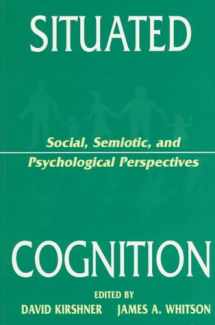
Situated Cognition: Social, Semiotic, and Psychological Perspectives
ISBN-13:
9780805820386
ISBN-10:
0805820388
Author:
David Kirshner, James A. Whitson
Publication date:
1997
Publisher:
Routledge
Format:
Paperback
336 pages
FREE US shipping
Book details
ISBN-13:
9780805820386
ISBN-10:
0805820388
Author:
David Kirshner, James A. Whitson
Publication date:
1997
Publisher:
Routledge
Format:
Paperback
336 pages
Summary
Situated Cognition: Social, Semiotic, and Psychological Perspectives (ISBN-13: 9780805820386 and ISBN-10: 0805820388), written by authors
David Kirshner, James A. Whitson, was published by Routledge in 1997.
With an overall rating of 3.8 stars, it's a notable title among other
Mental Health
(Social Psychology & Interactions, Psychology & Counseling, Cognitive Psychology, Behavioral Sciences, Psychiatry, Psychology, Clinical Psychology, Cognitive, General, Social Psychology & Interactions) books. You can easily purchase or rent Situated Cognition: Social, Semiotic, and Psychological Perspectives (Paperback) from BooksRun,
along with many other new and used
Mental Health
books
and textbooks.
And, if you're looking to sell your copy, our current buyback offer is $0.68.
Description
This book is a result of a symposium at a recent annual meeting of the American Educational Research Association that explored foundational issues relative to situated cognition theory. Its chapters contribute to discourse about repositioning situated cognition theory within the broader supporting disciplines and to resolving the problematics addressed within the book. There is a cumulative vision to the book -- its theme is that the notion of the individual in situated cognition theory needs to be fundamentally reformulated. No theoretical reconfiguration of the social world or of social practices can overcome an individual cast in the dualist tradition. This reformulation probes the physiological, psychoanalytic, and semiotic constitution of persons. Chapters authors cover a wide range of topics including: * transfer of training -- arguing that traditional cognitive psychology has found precious little evidence of people's ability to apply knowledge gained in one context to the problems encountered in another; * ecosocial systems -- a new object of inquiry for situated cognition theory in which the primary units of analysis are not things or people, but processes and practices; * how linkages between discursive practices are manifested as semiotic chaining of signifiers for individuals engaged in everyday activities at home or at school; * how the ability to function in ways that are consistent with logic emerges not through reflective abstraction on actions, but through an enhanced sense of agency as more responsible roles are adopted in daily life practices; * the mutual constitution of social and individual knowledge -- familiar terms and concepts normally available through linguistic labels are cultural models, to be distinguished from the variegated and hidden mid-level meanings that reflect their situated uses in social activity; * the material (neurological) substrate through which cultural models and mid-level meanings emerge; and * how learning environments can be structured to take advantage of the perceptual underpinnings of cognition.


We would LOVE it if you could help us and other readers by reviewing the book
Book review

Congratulations! We have received your book review.
{user}
{createdAt}
by {truncated_author}


